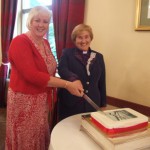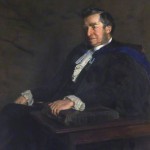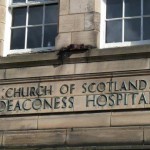UK: Diaconate Council of the Church of Scotland
The Church of Scotland, 121 George Street, Edinburgh, EH2 4YN
Tel: 0131 225 5722
www.churchofscotland.org.uk
Facebook page here.
Diaconate newsletter here.
The Diaconate is a ministry in the Church of Scotland. There are strong links with the Diaconal Association of the Church of England, the Methodist Diaconal Order and the Deaconesses within the Presbyterian Church in Ireland.The Diaconate of the Church of Scotland is a member of World Diakonia, and also Kaire, which has a meeting every two years bringing together Lutheran, Roman Catholic, Baptist, Reformed and Orthodox women for spiritual experience and retreat.
History – Wikipedia
There are two distinct offices of Deacon in the Church of Scotland. The best known form of diaconate are trained, paid pastoral workers, often working in parishes with considerable social and economic deprivation. The permanent diaconate was formerly exclusively female, and it was in the centenary year of the Diaconate (1988) that men were admitted to the office of Deacon. Women could not be ordained as Ministers until 1968. The offices of Deacon and Minister are now both open to both women and men; Deacons are now ordained (they were previously “commissioned”).
The other office of Deacon can be found in congregations formerly belonging to the pre-1900 Free Church of Scotland, with a “Deacons’ Court” having responsibility for financial and administrative oversight of congregations. Only a few congregations still retain this constitutional model, with most having since adopted the Church of Scotland’s “Model Constitution” (with a Kirk Session and Congregational Board) or “Unitary Congregation” (with just a Kirk Session). Most of the Free Church congregations united with the United Presbyterian Church of Scotland in 1900 creating the United Free Church of Scotland, which itself united with the Church of Scotland in 1929. The congregations of the Free Church of Scotland (post 1900) which did not join the UF Church in 1900 continue to have Deacons.
History (…cont)
Rev Archibald Charteris was a pioneer in the establishing diaconal ministry. He was born in 1835 and left his birth place in Moffat at 14 years old to attend Edinburgh University, where he later worked as a professor of biblical criticism. He then went on to found the Church of Scotland Guild in 1887, begin Life and Work magazine and reinstate the diaconate in the Church (1887). He was elected Moderator of the General Assembly of the Church of Scotland before he died in 1908. General Secretary of the Church of Scotland Guild Iain Whyte said “Archibald Charteris was a man of vision and determination who displayed great skills of leadership and organisation. His achievement in convincing the General Assembly of the need to recognise the place of women in the Church and to harness their skills and abilities has contributed to the shaping of the Church of Scotland over 127 years. The Woman’s Guild, now the Guild, the Diaconate and, indeed, the whole Church are eternally grateful for what he made possible.”
Dr Charteris’ had a vision that deaconesses would be ordained by presbyteries and fully integrated; it has taken 104 years for them to be integrated into presbyteries, and 114 years for them to be ordained to their office.
The first deaconesses had a focus on nursing. In 1894 the Church of Scotland opened the Deaconess Hospital within the Pleasance, Edinburgh. The Hospital which was built next to St. Ninian’s Mission which provided practical training in mission work among the overcrowded tenements of the Old Town. The Hospital contained the Lady Grisell Baillie Memorial.
The Deaconess Hospital provided practical training in nursing for Deaconesses, each of whom spent a year there as part of her training. Deaconesses who wished to become fully qualified nurses spent a further three years in the hospital’s Nurses’ Training School. The Hospital closed in 1990 and for a time became Deaconess House, headquarters of NHS Lothian.
The first deaconess to be commissioned was Lady Grisell Baillie (b. 4 April 1822) at a service conducted by Dr. Allardyce on 9th December 1888. Two more followed a few weeks later, when on 13 January 1889 Alice Maxwell and Catherine Davidson were set apart in St Cuthbert’s Church, Edinburgh. When the first conference of the Woman’s Guild was held in Edinburgh in November 1891 it was Lady Grisell Baillie who was the main speaker and she also presided over the morning session. Two weeks later, on 20 December 1891, she died of influenza aged 69. There is a memorial tablet to Lady Grisell in Bowden Kirk where the communion table is dedicated to her memory.
“On many occasions in the last 125 years, when the call, “Who will go for us?”, came from unknown territory and uncertain places, the first “Send Me!” was the voice of one of the Deacons”.
The Moderator of the Church of Scotland, the Rt Rev Lorna Hood, speaking to Deacons in 2013 said: “(Deacons) see the needs of the world and call the Church to respond to these needs, using your different gifts and talents through the years. You are the expression of a God who is with us, especially at the edges of life. Perhaps we, as a Church, need to show more of how much we value what you do. Perhaps we need to promote the Diaconate more.”

The president of the Diaconate Council, Elspeth McPheat and the Rt Rev Lorna Hood cut the 125th anniversary cake.
Diaconal ministry agents
Originally the diaconate was an office for women (deaconesses), but the Diaconate has been open to both men and women since 1988.
In 2013, there were 45 active deacons, of whom 28 were employed by the Ministries Council in a variety of posts. Over and above these active Deacons, a further 54 retired Deacons are active in the Diaconate Council and local Diaconate Groups.
Candidates
Ordination
Deacons in the Church of Scotland are ordained to their life-long office and are part of the Courts of the Church. A Deacon, on being ordained, shall be entitled to append the letters “DCS” (Deacon of the Church of Scotland) after his or her name and to wear the Diaconate badge. On being ordained, a Deacon shall be admitted into membership of the Diaconate Council.
The functions of the Diaconate Council, of which all Deacons are members, shall include the representation of the interests of all Deacons to the Ministries Council, and the support of the Ministries Council in the professional development of Deacons including in-service training and personal development. The Diaconate Council also maintains contact with those engaged in like work at home and overseas. The Diaconate Council has a Constitution and Standing Orders. Membership consists of all Deacons on the Active List, and all retired Deacons. Deacons with a Practising Certificate may attend Council at their own expense and be non-voting members. Deacons ordained or commissioned by the Church of Scotland who are serving overseas as members of another Church shall be entitled when on furlough to attend all meetings of the Council as corresponding members without the right to vote.
a) the election of Office-bearers, Committees and Representatives on the Ministries Council, such election to take place at the meeting of the Council in June
Office bearers:
* A President, who shall hold office for three years, and not be eligible for re-election.
(The 2013-2016 President is Mrs Pat Munro DCS, pat.munrodcs@gmail.
* A Vice President, who shall hold office for three years, and not be eligible for re-election.
* A Secretary, who shall be appointed for three years and be eligible for reappointment.
* A Treasurer, who shall be appointed for three years and be eligible for reappointment.
Two members are also appointed by the Ministries Council to the Diaconate Council.
The Local Associations aim
a) To provide a fellowship of Deacons
Roles and responsibilities of Deacons in the Church of Scotland
(see also the Deacons of the Gospel report)
Deacons work in a professional supportive role in a parish or elsewhere. Their work is primarily focussed on care and compassion for the poor and oppressed, and seeking social justice for all. It is characterised by loving service and usually takes place in the context of a larger team. Deacons are enablers, who strive to bring out in others the gifts they have to offer the Church and the community at large.
Deacons are rooted both in the congregation and the community. As such, they are able to challenge the worshipping congregation on issues concerning the community – issues such as poverty, housing, education and social exclusion. Deacons are free to do this because they are released from some of the obligations placed on the Parish Minister. Many Deacons are employed as Parish and Presbytery Workers – offering pastoral care in the community, and working with specific groups such as young people (often in schools) or with families. In many places they are called upon to conduct funerals and offer bereavement support. Deacons are able to conduct weddings. Deacons can also serve the community through work in various types of Chaplaincy and other recognised diaconal appointments.
Deacons meet people in all of life’s circumstances and in all kinds of places. Their role as carers is rooted in the wider pastoral ministry of the whole people of God, and often has a specific focus in the crisis points of people’s lives. Deacons are involved in many aspects of teaching programmes in Church and the community and through their involvement in issues of social justice, Deacons often take on the role of encouragers, standing alongside those who feel the isolation and loneliness of struggling against oppressive systems and people. Increasingly Deacons are being sought to work in Priority Areas Parishes – Scotland’s poorest communities.
Deacons may also engage in a prophetic role towards the Church arising out of their experience in such demanding community situations. Through their work with young people and children some Deacons may work alongside people with special needs, offering assurance that they have an equal place in society and much to contribute to it.
Deacons usually work as part of a team, and may regularly be involved in leading worship. This means they have to be people who know how to co-operate with others in a common task. They are always looking for the potential in others and seeking ways to help them fulfill it.
Deacons will be called on to work in partnership to devise new patterns for the worshipping life of the Church, especially for people who choose not to worship on a Sunday morning. They will strive to enable those with whom they come into contact to see the gospel as something relevant to their life and work.
As bridge builders between Church and community, Deacons seek ways to enable the community at large to celebrate the presence of God, both in the ordinary and in the crucial transitional points of life.
“Deacons meet people in all of life’s circumstances and in all kinds of places. Their role is rooted in the wider pastoral ministry of the whole people of God, and often has a specific focus in the crisis points of people’s lives. Deacons are involved in many aspects of teaching programmes in Church and the community and through their involvement in issues of social justice, Deacons often take on the role of encouragers, standing alongside those who feel the isolation and loneliness of struggling against oppressive systems and people. Deacons may also engage in a prophetic role towards the Church arising out of their experience in demanding community situations”. (Report, 2.3.6)
Sacramental
Deacons in the Church of Scotland do not celebrate the sacraments.
Deacons may be called upon to conduct funerals and offer bereavement services.
Deacons are able to conduct weddings.
Selection and training
The Working Group which prepared the 2001 Deacons of the Gospel Report (available on the Church of Scotland website at http://www.churchofscotland.org.uk/), presented to the General Assembly of 2001, was given four tasks:
* a theological reflection on the distinctive ministry of the Diaconate;
* a vocational profile of the Deacon;
* a set of theological and vocational criteria for the selection, education and training of the Diaconate;
* a scheme for selection, education and training.
Each Candidate shall have a Course prescribed by the Ministries Council immediately following acceptance as a Prospective Candidate.
Candidates will undertake 3 periods of placement work – normally 2 during the academic course (of which one shall be part-time and shall last not less than 25 weeks and one shall be a full-time summer placement lasting not less than 10 weeks) and one full-time placement of 12 months.
Emerging directions
As with other forms of ministry, the Diaconate is undergoing a time of radical rethinking. The Church is beginning to see new and exciting patterns of ministry emerge. The Diaconate Council of Diaconal ministry has been working towards a renewed vision and affirmation of Diaconal Ministry.
The Church’s Deacons, both those who work for the Ministries Council and those who engage in other roles, contribute significantly to God’s mission and to helping the Church in refocusing ministries on mission.
“As Scottish society becomes increasingly post-Christian, the role of the Diaconate as working at the edge becomes more significant. In a sense Deacons represent the Church at the margins and enable the Church to rediscover what that means. This is particularly true as historically Deacons have worked in some of the poorest and most challenging parishes in Scotland, responding to the Gospel priority to the poor, and this continues to be the case for a significant number of those Deacons employed by the Ministries Council”. (Report, 2.3.7)
More broadly the following work has been undertaken:
A report has been prepared, Ministry During a Change of Age.
The Council continues to work positively together with the Mission & Discipleship Council through the Joint Emerging Church Group on new ways of being Church in the 21st Century.
An independent organisation, Place for Hope is recognised by the Council as a critical vehicle and catalyst in supporting and enabling the 21st century church in Scotland to develop creative, positive and life–giving ways to explore and express differences. The vision of Place for Hope is that within our churches and communities a culture can be developed that acknowledges differences and values unity in diversity.
Challenges
“Following a period of moratorium on recruitment in the early 2000s, it proved difficult to encourage vocations to Diaconal ministry. While some have responded in recent years, there is a need to raise the profile of the Diaconate across the Church, and to issue a call to service through clear affirmation of the role and the contribution of Deacons. The Council believes that there is a valuable place for Diaconal ministry in the Church of Scotland in the 21st century. A DVD entitled Saying Yes to God has also been produced to broaden awareness of Diaconal ministry and this can be obtained from the Council on request. All Presbytery Clerks have also received a copy to widen availability at a local level. The Council is happy to commend this excellent resource which is available on request from the Ministries Council office (contact lhood@cofscotland.org.uk) (Report, 2.3.8)
2013 Report
Deacons of the Gospel report
Consolidating and Amending Act Anent Deacons, General Assembly May 2010, Edinburgh
Media
Celebrating 125 years
Publications
“A story to tell – the Diaconate”, by Morag Crawford, published by the Diaconate Council of the Church of Scotland, December 2013.
***
Information to be collected includes (but is not limited to) the following questions.
A brief history (may include links to documents and websites) – how did it all get started? What are the key dates and events? Are there documents that are part of the history (please specify)?
Historical information and dates re formation/recognition of diaconal ministry agents in the denomination/church agency.
Does the diaconal ministry agent wear a distinctive uniform? Are diaconal ministry agents able to be married? Are they remunerated? Do they live in community (eg motherhouse) or independently? Etc.
What kind of training/formation do diaconal ministry agents receive before formal recognition in their church. Are there expectations of ongoing training, or professional development? If yes, what is expected and how often does it happen?
How many diaconal ministry agents are there currently in the denomination or church agency? Any comment on trends in numbers?
Are there key people (historical or current) in the organization who have provided significant leadership. Any weblinks to their story, or a short write up?
Who are the current leaders in the diaconal association? (photos, ‘blurb’).
Relationship of diaconal ministry agents to a denomination/church agency
An overview of main responsibilities for diaconal ministry agents (past and present). Are they located within a church, a particular facility or agency, or community based? Are diaconal ministry agents appointed to individual placements or work together on projects or in institutions?
Are diaconal ministry agents able to preside at sacraments (communion, baptism, weddings etc)?
Who makes the appointments for diaconal ministry agents eg they apply for positions, they are appointed (eg by a Bishop, by the conference office, or another body/committee).
Is there a length of time for appointments (eg usually less than 5 years, usually between 5 and 10 years, at the discretion of the diaconal ministry agent or at the discretion of the appointing body), appointed to and remain with a particular mother house, etc.
Do diaconal ministry agents organize conferences, seminars, gatherings for professional development, pastoral peer support etc? How often and what is the nature of these events?
Key issues and challenges in the contemporary ministry context
Do the diaconal ministry agents have ‘code of conduct’ or ‘code of ethics’ that inform ethical and behavioral expectations for ministry?
Key documents (historical, vision and mission etc) – links or PDF or Word files
Photos
Links to relevant articles, websites etc
Other areas of interest……
(information to Rev Sandy Boyce, President, DIAKONIA World Federation, sandyeboyce@gmail.com, to upload to this website)






